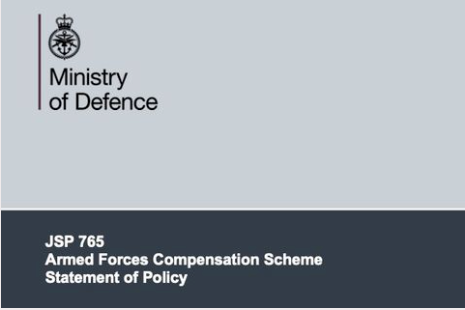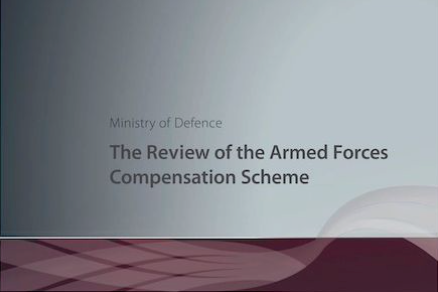Improvements
Improving the system
I don't know enough about how government departments work to suggest detailed ways of improving the AFCS. Here are my crazy ideas instead.

Follow the fucking rules
I'll start with the wackiest, most left-field idea. How about the medical advisers comment on what they're qualified to (which very clearly doesn't include the medico legal aspects of the AFCS) and... ah fuck it, this is never going to happen.

Clean slate
I can't imagine this would work, as it would just be spending loads of time rebuilding the same thing, delaying everyone's applications, and probably ending up where we are anyway, just like when they burned down the Walmart in South Park.
Photo by Noita Digital on Unsplash

Have Veterans run it!
Because procurement works brilliantly with service personnel doing it...

Review
Admiral the Lord Boyce Reviewed the AFCS in 2010 and followed up the review a year later. It would be interesting to see what he thinks of how the Scheme has run since his review.

Costs
If it's found, perhaps by an independent audit, that Veterans UK have under assessed awards, whether by ignorance or design, I believe there should be costs awards. This would be to pay the legal fees of all those who have used lawyers to get the correct award. It would also be to pay for legal review of all past awards to ensure those who were made to give up because of the oppressive way the system is run are correctly compensated, at no additional cost to them. If this is widespread I would also recommend indemnity costs, essentially a punishment costs order for really bad behaviour, which could be paid to the charities that have had to support veterans' claims and support their families.

Independent assessments with fixed costs
In clinical negligence, one cost saving measure is what's called the pre-action protocol, and there are such protocols in other areas of litigation too.
Before court proceedings are issued, which have a fee and are more time consuming, there are procedures to try and complete claims for less cost. The protocol identifies claims where there is clear negligence and can be settled early, and claims that are clearly spurious and can be dismissed.
For AFCS, we could set up an approved panel of law firms, with experience of the Scheme, to review all the claims for a reasonable fixed fee paid by MoD. They would gather and filter medical and military records and send the relevant parts to an approved medical expert for a fixed fee review and assessment. This would identify claims that can be given an immediate award, and claims that need a more detailed review of the records and potentially an in person assessment of the claimant, for an increased fixed fee. These assessments could be subject to a reasonable time limit to give claimants some certainty, say 3 - 4 months for the initial review, and a similar time period for any further assessment or additional expert input in complex, multi-injury cases.
It would essentially be doing what Veterans UK should be doing but have proved incapable of.
Photo by Eduardo Alexandre on Unsplash

Mediation
Mediation is another method used to try and settle negligence claims without going all the way to a trial in court. Instead of a judge you have a mediator, and although you still have solicitors, barristers and experts, the process is about settling the claim through agreement. Both sides discuss the evidence in the presence of the mediator, who guides the discussion and keeps it reasonable. The parties can pop to a side room to discuss progress in private. Then an agreement is usually reached and the case is settled (or not and it proceeds to trial.)
There is still a cost involved, as the mediator, lawyers and experts still need to be paid for. In my opinion, SPVA / Veterans UK have had 17 years of the AFCS, and 12 years since the Boyce Review to get the system right, and they've failed. Any expense in sorting it out should be borne by them, and they can't have any complaints. I think mediation for the higher value claims would be a good idea.
Photo by Nastuh Abootalebi on Unsplash

Remove time limits
As I've mentioned elsewhere on the site, I see no reason why there are time limits for claiming under AFCS.
If you're injured in 2015 then you will always have been injured in 2015. Your injury may resolve in a short space of time, or it might be permanent. It may be a complex, long running injury. You don't get more money for claiming later. If you were to claim for your 2015 injury in 2025, the lump sum will be the same, and any GIP runs from the date of your claim form. If the lump sum has increased following a review of the Scheme, you could be awarded the sum that was in place at the time of your injury.
The only thing I can imagine that might affect a claim is the destruction of medical records. Hospitals are entitled to destroy notes after a number of years, although now most are digitised, there is less of an issue. Loss of records should not count against a claimant. It could be made clear to claimants that awards may be affected by destruction of records where it is permitted after so many years, and so it is best to get a claim in earlier than later.
Other than that I don't think there's a reason for time limits on AFCS claims. Apparently MoD fights limitation tooth and nail, so if you put a claim in late, it's very hard to progress it. There are so many reasons a service person or veteran may not be willing or able to claim within 3 years for physical injury or 7 for mental injury.
Photo by Aron Visuals on Unsplash

Share your AFCS experience, but only if you're totally happy to
There are different ways to make your experience of AFCS count. The most important thing, though, is to do what's right for you. I'm usually a pretty private person, but I've obviously had a good bleat on Instagram about AFCS and then gone and made this website.
It did seem for a while, however, that there was broadening dissatisfaction with the AFCS process, and I have heard a lot of anecdotal comments suggesting the system doesn't work as it should. Social media is often an echo chamber though, so it might have seemed to me that there was growing anger about AFCS, when I may just have been another person whingeing about not getting a big payout.
If there does come a time when Veterans UK are re-examined, I imagine having first hand stories of how claimants were treated will be useful. There are charities that help with AFCS claims, and you could tell them of your experience even if they weren't involved in your claim.
Parliament is the obvious place to me, and my MP has been very helpful, although the responses to her from MoD have not been. I think a brief, single letter to your MP would give them an idea of what the AFCS system is doing to claimants. You don't have to go into your injury details, but just give an idea of the claim handling. If your MP then ends up in a committee, or a debate, or even a chat over champagne and caviar with an MP reservist or veteran, they have an idea of what's going on, and word of mouth can help prepare them to do something.
I hope, anyway.

